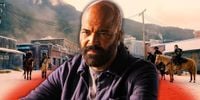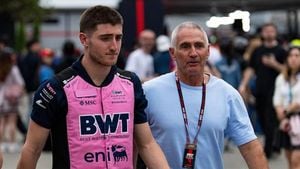Jeffrey Wright has returned to the world of The Last of Us, reprising his role as Isaac Dixon in the critically acclaimed HBO series. Known for his impressive performances in The Batman, the Daniel Craig James Bond films, and Angels in America, where he won a Tony Award for the Broadway version and an Emmy for the HBO adaptation, Wright's involvement in The Last of Us marks another significant chapter in his storied career.
Wright first voiced Isaac in The Last of Us Part II, and his return in Season 2, Episode 4 of the HBO series is a major win for fans and the show alike, especially given that his role in the game was relatively brief. As the leader of the Washington Liberation Front (WLF), Isaac is a complex character whose motivations and actions are explored more deeply in the series than in the game.
In an interview with TVLine, Wright shared the personal connection that led him to take on the role of Isaac. "I voiced the game really because my son was a fan of the game," he explained. He recounted how his son, Elijah, expressed excitement at the prospect of his father participating in the adaptation. Wright's connections to the series also run deep, with Westworld co-stars Shannon Woodward and Halley Gross playing significant roles in both the game and the show.
Isaac's character in the HBO adaptation is introduced much earlier than in the game, allowing viewers to witness his backstory and motivations. In the opening scene of Episode 4, Isaac is depicted as a member of FEDRA, a government organization that oppresses the citizens of Seattle. This cold open, which lasts just over five minutes, showcases Isaac's ruthless nature as he takes decisive action against FEDRA forces, setting the tone for his character's complexities.
In the game, Isaac is only mentioned in documents collected by players during Ellie's storyline, which builds a mystique around him. However, the show takes the opportunity to flesh out his character, giving him more screen time and allowing audiences to understand his disdain for the Seraphites, whom he and the WLF derogatorily refer to as "Scars." This animosity is central to his character and the ongoing conflict within the narrative.
In a pivotal moment during the episode, Wright's Isaac interrogates a Seraphite, showcasing his brutal methods. This scene, which runs just shy of six minutes, highlights Isaac's cold demeanor and the moral complexities of the world he inhabits. The Seraphite warns Isaac of the growing influence of their faith, stating, "Every day, one of your Wolves comes to see the truth and takes her (The Prophet) into their hearts." This moment serves to deepen Isaac's character, presenting him as a leader who is both powerful and vulnerable.
Wright's portrayal of Isaac has been praised for its depth and nuance. Critics have noted that the show has already provided more insight into Isaac's character than the game did, effectively expanding his backstory and motivations. In just one episode, Isaac's presence has been significantly amplified, and viewers are eager to see how his story will evolve in future episodes.
Meanwhile, Wright's earlier role as Valentin Narcisse in HBO's Boardwalk Empire showcased his ability to portray complex villains. Narcisse, a prominent member of the Universal Negro Improvement Association, was a character who manipulated racial tensions to his advantage, contrasting sharply with other characters like Nucky Thompson, played by Steve Buscemi. This role allowed Wright to explore themes of power, race, and morality, much like his current role as Isaac.
Valentin Narcisse was not a physically imposing threat; instead, he wielded his intelligence and charisma to exert control over his environment. He took advantage of Nucky's vulnerabilities and filled the power vacuum in Atlantic City's underground clubs. Wright's performance brought a level of sophistication to the character, making him one of the most memorable villains in the series.
In the fourth season of Boardwalk Empire, Narcisse's actions created significant racial tension, mirroring the societal issues of the 1920s. He framed himself as a successful black man who had achieved the American dream, yet he exploited those around him, particularly the black artists in his clubs. This duplicity put him at odds with Chalky White, another character who faced the harsh realities of race and power in America.
Wright's portrayal of both Isaac and Narcisse demonstrates his range as an actor and his ability to inhabit characters who navigate complex moral landscapes. As the storylines unfold in The Last of Us, viewers can expect to see more of Isaac's complexities, as the series delves into the nuances of leadership, loyalty, and the consequences of one's choices.
In conclusion, Jeffrey Wright's return to The Last of Us as Isaac Dixon not only enriches the narrative but also highlights the actor's incredible versatility. With his performance, Wright continues to captivate audiences, bringing depth to characters that challenge our understanding of morality and humanity in a post-apocalyptic world.




